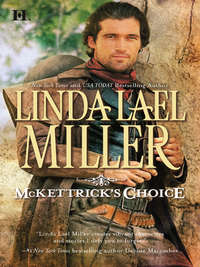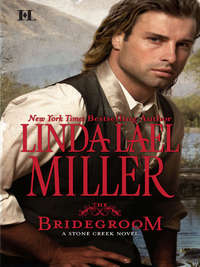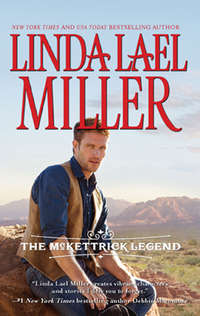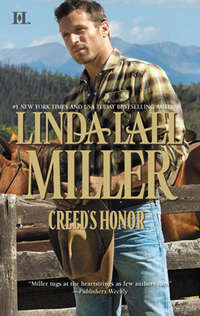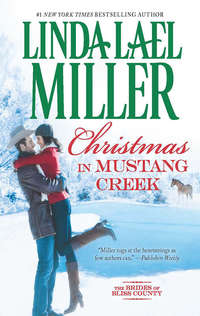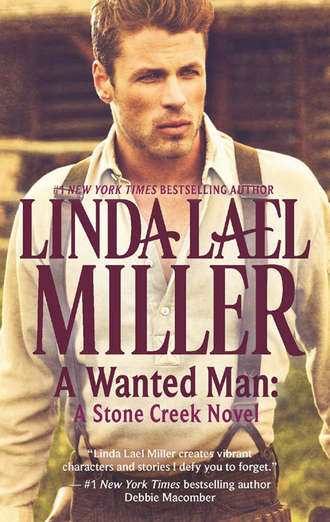
Полная версия
A Wanted Man: A Stone Creek Novel

#1 New York Times bestselling author Linda Lael Miller returns to Stone Creek with a classic tale of two strangers running from dangerous secrets
The past has a way of catching up with folks in Stone Creek, Arizona. But schoolmarm Lark Morgan and Marshal Rowdy Rhodes are determined to hide their secrets—and deny their instant attraction. That should be easy, since each suspects the other of living a lie….
Yet Rowdy and Lark share one truth: both face real dangers. Such as the gang of train robbers heading their way, men Ranger Sam O’Ballivan expects Rowdy to nab. As past and current troubles collide, Rowdy and Lark must surrender their pride to the greatest power of all—undying love.
Praise for #1 New York Times and USA TODAY bestselling author Linda Lael Miller
“Miller tugs at the heartstrings as few authors can.”
—Publishers Weekly
“This is a delightful addition to Miller’s Big Sky series. This author has a way with a phrase that is nigh-on poetic, and all of the snappy little interactions between the main and secondary characters make this story especially entertaining.”
—RT Book Reviews on Big Sky Mountain
“Miller’s down-home, easy-to-read style keeps the plot moving, and she includes…likable characters, picturesque descriptions and some very sweet pets.”
—Publishers Weekly on Big Sky Country
“After reading this book your heart will be so full of Christmas cheer you’ll want to stuff a copy in the stocking of every romance fan you know!”
—USATODAY.com Happy Ever After on A Lawman’s Christmas
“Miller’s attention to small details makes her stories a delight to read. With engaging characters and loveable animals, this second story in the Creed Cowboys trilogy is a sure hit for the legions of cowboy fans out there.”
—RT Book Reviews on Creed’s Honor
“A passionate love too long denied drives the action in this multifaceted, emotionally rich reunion story that overflows with breathtaking sexual chemistry.”
—Library Journal on McKettricks of Texas: Tate
“This is Western romance at its finest.”
—RT Book Reviews on The Man from Stone Creek
“Strong characterization and a vivid Western setting make for a fine historical romance.”
—Publishers Weekly on McKettrick’s Choice
A Wanted Man: A Stone Creek Novel
Linda Lael Miller

www.millsandboon.co.uk
Dear Reader,
I’m so excited you’re back in Stone Creek again! A Wanted Man is the story of two passionate people with secrets to keep. Rowdy Rhodes appeared very briefly in The Man from Stone Creek, and the first time he walked onto the stage of my mind, I knew he would have his own story. Rowdy is a fascinating enigma, an outlaw with honor, a fugitive with courage, a teller of truth whose whole life is basically a lie. Lark Morgan, the woman he didn’t plan on meeting, let alone loving, is guarding dangerous secrets of her own. So come along with Rowdy, Lark and me on a journey to Stone Creek as it was in the turbulent early years of the last century.
I would also like to tell you about the scholarship program that I finance—Linda Lael Miller Scholarships for Women, awarded to those seeking to improve their lot in life through education. You can find more information on my website, www.lindalaelmiller.com.
Also, be sure to look out for a brand-new book coming in June, the start of a fresh trilogy set in Parable, Montana. Big Sky Summer is the story of Walker Parrish, handsome rodeo cowboy turned stock contractor, and Casey Elder, a fiery redheaded country and western singer. The secret they’re keeping will either bond them forever at the heart, or drive them apart. I can’t wait for you to mosey on back to Parable and step into their world!
Happy reading!

For Shaun Bleecker, who identifies so strongly with Rowdy—perhaps because he’s a hero, too.
Contents
Chapter 1
Chapter 2
Chapter 3
Chapter 4
Chapter 5
Chapter 6
Chapter 7
Chapter 8
Chapter 9
Chapter 10
Chapter 11
Chapter 12
Chapter 13
Chapter 14
Chapter 15
Chapter 16
Chapter 17
Chapter 18
Chapter 19
Chapter 20
1
Stone Creek, Arizona Territory
January, 1905
ROWDY RHODES LEANED BACK in the whorehouse bathtub, a cheroot jutting from between his teeth, and sighed as he waited for the chill of a high-country winter to seep out of his bones.
Jolene, an aging madam with pockmarked skin, three visible teeth and a bustle the size of the Sonoran Desert, sloshed another bucketful of steaming water at his feet. “I done seen everything now,” she told him, her eyes narrowed in lascivious speculation as she studied Rowdy’s submerged frame. “Ain’t nobody never brought a dog to my bathhouse before.”
Pardner, the old yellow hound, sat soaked and bewildered in the tub next to Rowdy’s. He’d gotten pretty scruffy on the long ride up from Haven, the dog had, and Rowdy meant to take him for barbering next. They could both do with a haircut, and Rowdy was itching for a shave.
Pardner was just plain itching.
“Always a first time,” Rowdy said, drawing on the cheroot and then blowing a smoke ring.
Jolene lingered, probably hoping to do less-hygienic business, but willing to settle for whatever conversation might come her way. “It’s one thing, you payin’ for clean water for yourself, but I don’t see how as it makes a difference to the dog.”
Rowdy grinned and blew another smoke ring. “We’ll be wanting steaks, soon as we’re dried off and decent, if you can scare them up,” he told Jolene. “Pardner likes his rare.”
“If that don’t beat all,” Jolene said, pondering the hound. “I can get steaks, all right, but they’ll cost you a pretty penny. And if you’ve a mind to pass the time upstairs with any of my girls, cowboy, your partner here will have to wait in the hall.”
Given that he was naked, and in a prone position, Rowdy didn’t see any profit in pointing out that he didn’t have truck with whores. His .44 was within easy reach, as always, but shooting a woman, saint or sinner, was outside the boundaries of his personal code. Unless, of course, she drew first.
“No time for idling with the ladies,” he said, feigning regret. He idled with plenty of ladies, whenever he got the chance, but he favored fine, upstanding widows.
“You lookin’ for ranch work?” Jolene asked, in no apparent hurry to rustle up the steaks.
“Maybe,” Rowdy answered. The truth was, he’d been summoned to Stone Creek by none other than Major John Blackstone and Sam O’Ballivan, an Arizona Ranger he’d chanced to encounter down south, a little over a year before, in the border town of Haven. He’d come partly because he and Pardner hadn’t had anything better to do, and because he was curious. And there were a few other reasons, too.
He suspected his pa was somewhere in these parts, up to his old tricks, for one.
“Try Sam O’Ballivan’s place,” Jolene said helpfully. “Sam’s a fair man, and he’s always hirin’ on hands to feed them cattle of his.”
Rowdy nodded. “Obliged,” he said.
“Not that you’re hurtin’ for money, if you can afford clean bathwater and a steak for a dog,” Jolene added.
“A man can always use money,” Rowdy allowed, wishing Jolene would order up the steaks, go back to riding herd over the drunks he’d seen out front in the saloon swilling whiskey, and leave him to bathe in peace.
Pardner gave a despairing whimper.
“Just bide there for a while,” Rowdy told him quietly.
Pardner huffed out a sigh and hunkered down to endure. He was a faithful old fella, Pardner was. He’d trotted alongside Rowdy’s horse for the first few miles out of Haven, but then he’d gotten footsore and come the rest of the way in the saddle. As they traveled north, the weather got colder, and they’d shared Rowdy’s dusty old canvas coat.
Remembering the looks they’d gotten from the townsfolk, him and Pardner, riding into town barely an hour before, Rowdy smiled. Even with a new and modern century underway, the Arizona Territory was still wild and woolly, and odd sights were plentiful. He wouldn’t have thought a man and a dog on the back of the same horse would attract so much notice.
“You run along and see to those steaks,” Rowdy told Jolene. Even with the bucketful of hot water she’d just poured into his tub, the bath was lukewarm, and there was cold air coming up through the cracks between the ancient, warped floorboards. He wanted to scrub himself down with the harsh yellow soap provided, dry off, and get into the clean duds he’d saved for the purpose.
Of course, Pardner needed sudsing, too, and Rowdy didn’t reckon even Jolene’s services extended quite that far.
Jolene hadn’t had her fill of visiting, that much was clear by her disgruntled aspect, but she lit out for the kitchen, just the same.
Rowdy finished his bath, dressed himself, then laundered Pardner as best he could. He was toweling the poor critter off with a burlap feed sack when he heard the sound of spurs chinking just outside the door.
Rowdy didn’t hold with the use of spurs, branding irons or barbed wire. Whenever he encountered any one of those three things, he bristled on the inside.
Out of habit he touched the handle of his .44, just to make sure it was on his left hip, where it ought to be.
Pardner bared his teeth and snarled when two drifters strolled in.
“Easy,” Rowdy told the animal, rising from a crouch to stand facing the strangers. One was short, and the other tall. Both were in sore need of a bath, not to mention the services of a dentist.
The short one looked Pardner over, scowling. His right hand eased toward the .45 in his holster.
Rowdy’s own .44 was in his hand so fast he might have willed it there, instead of drawing. “I wouldn’t,” he said affably.
“It’s a hell of a thing when a man’s expected to bathe himself in a dog’s water,” the taller one observed. He had a long, narrow face, full of sorrow, and thin brown hair that clung to the shape of his head, as if afraid of blowing away in a high wind.
“For an extra nickel,” Rowdy said, “you can have your own.”
The short man took a step toward Rowdy, and it was the tall one who reached out an arm and stopped him. “Me and Willie, here, we don’t want no trouble. We’re just lookin’ for hot water and women.”
Willie subsided, but he didn’t look too happy about it. Rowdy reckoned he’d have shot Pardner just for being there, if he’d had his druthers. Fortunately for him, his sidekick had interceded before it would have been necessary to put a bullet through his heart.
Pardner, who looked a sight with his fur all ruffled up and standing upright on his hide like quills on a porcupine, from the rubdown with a burlap sack, growled low and in earnest.
Yes, sir, Rowdy thought, looking down at him, he did want barbering.
“That dog bite?” Willie asked. A muscle twitched in the beard stubble along his right cheek. He carried himself like a man of little consequence determined to give another kind of impression.
“Only if provoked,” Rowdy answered mildly, slipping the .44 back into its holster. He was hungry, but he tarried, for it was his habit to take careful note of everyone he encountered, be they friend or foe. Pappy had taught him that, and it had proved a useful skill.
Just then Jolene trundled in with the littlest Chinaman Rowdy had ever seen trotting behind her. The sight put him in mind of a loaded barge cutting through the muddy Mississippi with a rowboat bobbing in its wake.
“Ten cents if you want clean water,” Jolene told the new arrivals, clearly relishing the prospect of ready commerce. “A nickel if you don’t mind secondhand.”
Willie and the sidekick didn’t look as though they were in a position to be too picky.
“A dime for a tub of hot water?” Willie demanded, aggrieved. “It’s plain robbery.”
The tall man took a tobacco sack from the inside pocket of his coat and dumped a pile of change into a palm. After counting out the coins carefully, he handed them over to Jolene.
“We’ll have the best of your services,” he said formally.
The Chinaman, strong for his size, nodded at a go-ahead from Jolene and turned Pardner’s tub over onto its side, so the water poured down through the gaps between the floorboards.
“I ain’t bathin’ in the same tub as no dog, Harlan,” Willie told his friend stoutly.
Harlan sighed. “Willie, sometimes you are a trial to my spirit,” he said. “That mutt was probably cleaner than you are before he even set foot in this place.”
“Them steaks are about ready,” Jolene informed Rowdy, giving Pardner a dark assessment. “I don’t reckon the dog could eat out back, instead of in my dining room?”
“You ‘don’t reckon’ right,” Rowdy said pleasantly. With cordial nods to Harlan and Willie, he made for the bathhouse door, Pardner right on his heels.
* * *
LARK MORGAN WATCHED slantwise from an upstairs window of Mrs. Porter’s Rooming House as the stranger strode across the road from Jolene Bell’s establishment to the barbershop, the dog walking close by his side.
The man wore a trail coat that could have used a good shaking out, and his hair, long enough to curl at the back of his collar, gleamed pale gold in the afternoon sunlight. His hat was battered, but of good quality, and the same could be said of his boots. While not necessarily a person of means, he was no ordinary saddle bum, either.
And that worried Lark more than anything else—except maybe the bulge low on his left hip, indicating that he was wearing a sidearm.
She frowned. Drew back from the window when the stranger suddenly turned, his gaze slicing to the very window she was peering out of, as surely as if he’d felt her watching him. Her heart rose into her throat and fluttered there.
A hand coming to rest on her arm made her start.
Ellie Lou Porter, her landlady, stepped back, her eyes wide. Mrs. Porter was a doelike creature, tiny and frail and painfully plain. Behind that unremarkable face, however, lurked a shrewd and very busy brain.
“I’m so sorry, Lark,” Mrs. Porter said, watching through the window as the stranger finally turned away and stepped into the barbershop, taking the dog with him. “I didn’t mean to frighten you.”
Lark willed her heart to settle back into its ordinary place and beat properly. “You didn’t,” she lied. “I was just—distracted, and you caught me off guard.”
Mrs. Porter smiled knowingly. There wasn’t much that went on in or around Stone Creek, Lark had quickly learned, that escaped the woman’s scrutiny. “His name is Rowdy Rhodes,” she said, evidently speaking of the stranger who had just entered the barbershop. “As you may know, my cook, Mai Lee, is married to Jolene’s houseboy, and she carries a tale readily enough.” She paused, shuddering, though whether over Jolene or the houseboy, Lark had no way of knowing. “It’s got to be an alias, of course,” Mrs. Porter finished.
Lark was not reassured. If it hadn’t been against her better judgment, she’d have gone right down to the barbershop, a place where women were no more welcome than in her former husband’s gentleman’s club in Denver, and demanded that the stranger explain himself and his presence in her hiding place.
“Do you think he’s a gunslinger?” she asked, trying to sound merely interested. In her mind she was already packing her things, preparing to catch the first stagecoach out of Stone Creek, heading anywhere. Fast.
“Could be,” Mrs. Porter said thoughtfully. “Or he might be a lawman.”
“He’s probably just passing through.”
“I don’t think so,” Mrs. Porter replied, her face draped in the patterned shadow of the lace curtains covering the hallway window.
“What makes you say that?” Lark wanted to know.
Mrs. Porter smiled. “It’s just a feeling I have,” she said. “Whoever he is, he’s got business around here. He moves like a man with a purpose he means to accomplish.”
Lark was further discomforted. She barely knew her landlady, but she’d ascertained at their first meeting that Mrs. Porter was alarmingly perceptive. Although the other woman hadn’t actually contradicted Lark’s well-rehearsed story that she was a maiden schoolteacher, she’d taken pointed notice of her new boarder’s velvet traveling suit, Parisian hat, costly trunk and matching reticules.
Stupid, Lark thought, remembering the day, a little over three months before, when she’d presented herself at Mrs. Porter’s door and inquired after a room. I should have worn calico, or bombazine.
Now, in light of the stranger’s arrival, she had more to worry about than her wardrobe, plainly more suited to the wife of a rich and powerful man than an underpaid schoolmarm. What if Autry had found her, at long last? What if he’d sent Rowdy Rhodes, or whoever he was, to drag her back to Denver or, worse yet, simply kill her?
Lark suppressed a shudder. Autry’s reach was long, and so was his memory. He was a man of savage pride, and he wouldn’t soon forget the humiliation she’d dealt him by the almost-unheard-of act of filing for a divorce. Denver society was probably still twittering over the scandal.
“Come downstairs, dear,” Mrs. Porter said, with unexpected gentleness. “I’ll brew us a nice pot of tea, and we’ll chat.”
Lark wanted to refuse the invitation—wished she’d said right away that she needed to work out lesson plans for the coming week, or shop for toiletries at the mercantile, or run some other Saturday errand, but she hadn’t. And she’d surely aroused Mrs. Porter’s assiduous curiosity by jumping at the touch of her hand.
“Thank you,” she said, smiling determinedly and under no illusion that Mrs. Porter wanted to “chat.” Lark knew she was a puzzle to her landlady, one the woman meant to solve. “That would be very nice. If I could just freshen up a little—”
Mrs. Porter nodded her acquiescence, returned Lark’s smile and descended the back stairway, into the kitchen.
Lark hurried into her room, shut the door and leaned against it, staring at her own reflection in the bureau mirror directly opposite. She’d dyed her fair hair a dark shade of chestnut, in an effort to disguise herself, but her brown eyes, once her greatest vanity, were her most distinguishing feature, and there had, of course, been nothing she could do about them. She supposed she might have purchased dark glasses and pretended to be blind, but her funds had been nearly exhausted by the time she reached Stone Creek, and she’d needed immediate employment. Even in an isolated place like that one, where teachers were hard to come by, nobody would have hired someone with such a hindrance and, besides, the illusion of blindness would have been almost impossible to sustain.
Keeping her hair dyed was hard enough.
She laid a hand to her bosom and forced herself to breathe slowly and deeply. She mustn’t panic. Most likely Mr. Rhodes was merely passing through, whatever Mrs. Porter’s speculations to the contrary.
Lark smoothed her crisp black skirt, straightened the cameo at the throat of her white shirtwaist, patted her hair. She’d been reckless, keeping the clothes from her old life, and she should have changed her first name, too, as well as her last. Autry had taken everything else from her—her pride, her self-respect, her dignity. She’d fled with her favorite gowns, two weeks’ allowance, and the money he kept hidden in the humidor in his study.
A few garments and the name her mother had given her at birth seemed little enough to claim as her own.
After steadying herself as best she could, Lark walked decorously to the top of the stairs, glided down them and swept into Mrs. Porter’s spacious, homey kitchen. The huge black cookstove, with its shining chrome trim, radiated warmth, and the delicious scent of brewing tea filled the room.
“I’ve set out a plate of my lemon tarts,” Mrs. Porter said, with a nod to the offering in the center of the round oak table. “Mr. Porter loved them, you know.” She paused, sighed sadly. “Dear Mr. Porter.”
Lark assumed Mr. Porter was deceased, since Mrs. Porter always referred to him in the past tense, but there were signs of his presence all over the house. His hat still hung on a brass hook in the front entryway, for instance, and books with his name inscribed on the flyleaf lay open, here and there, as though he’d just been perusing them. A half-smoked cigar lay in the ashtray on his desk in the study, and his birthday—January 28—was noted on the wall calendar next to the pantry door.
Not quite daring to inquire after him, Lark simply nodded and helped herself to one of the tarts.
“Sit down and make yourself comfortable, dear,” Mrs. Porter urged. “One shouldn’t eat standing up. It’s bad for the digestion.”
Circumspectly Lark took a chair, careful to avoid Mr. Porter’s. Roomers came and went, but, as if by tacit agreement, no one ever sat in Mr. Porter’s place. At present, Lark was the only permanent boarder, although a traveling dry goods salesman occasionally took the large room adjoining the kitchen.
Secretly Lark coveted that room, because it had its own entrance, a brick fireplace, a desk and a small sitting area, but the price of it was beyond her means. Ironic, she reflected, since her weekly budget for freshly cut flowers to grace her dining room table back in Denver would have covered a month’s rent, with money to spare.
“Maybe he’s come to work on the railroad,” Mrs. Porter speculated suddenly.
Lark hoped the look on her face would pass for puzzlement, though it was actually apprehension. Had she realized the railroad was coming to Stone Creek, she wouldn’t even have gotten off the stagecoach at all, let alone taken a room and applied for the recently vacated teaching position at the town’s primitive little school. Indeed, she’d been settled in before she’d known, with the last of her funds spent to secure living quarters.
Mrs. Porter smiled brightly, setting two bone china teacups on the table with a merry little clatter. “I’m referring to Rowdy Rhodes, of course,” she explained, her tone cheerful, her eyes alert. “Mr. Porter always complained that I just say things, out of the clear blue sky, with no sort of preamble whatsoever.” She paused, frowning a little. “Yes, I’m sure he’s here to help build the railroad.”
“It’s quite all right,” Lark said. Everyone else in Stone Creek was excited at the prospect of train tracks and a depot linking them to such far-flung places as Flagstaff and Phoenix; the economic benefits were considerable. To Lark, however, the coming of the railroad meant disaster, because Autry owned it. By spring, the countryside would be crawling with his minions and henchmen—he might even show up himself.
Just the thought of that made her shiver.
Mrs. Porter sat down, then poured tea from the lovely pot, which matched the cups and saucers. Looking at the delicate objects, Lark was seized by a sudden and poignant yearning for the life she’d left behind. Unfortunately, that life had included Autry Whitman, and had therefore been untenable.
“How are things going at school?” Mrs. Porter asked companionably, but the questions she really wanted to ask were visible in her eyes.
Who are you, really?
Where did you come from?
And why are you so frightened all the time?


